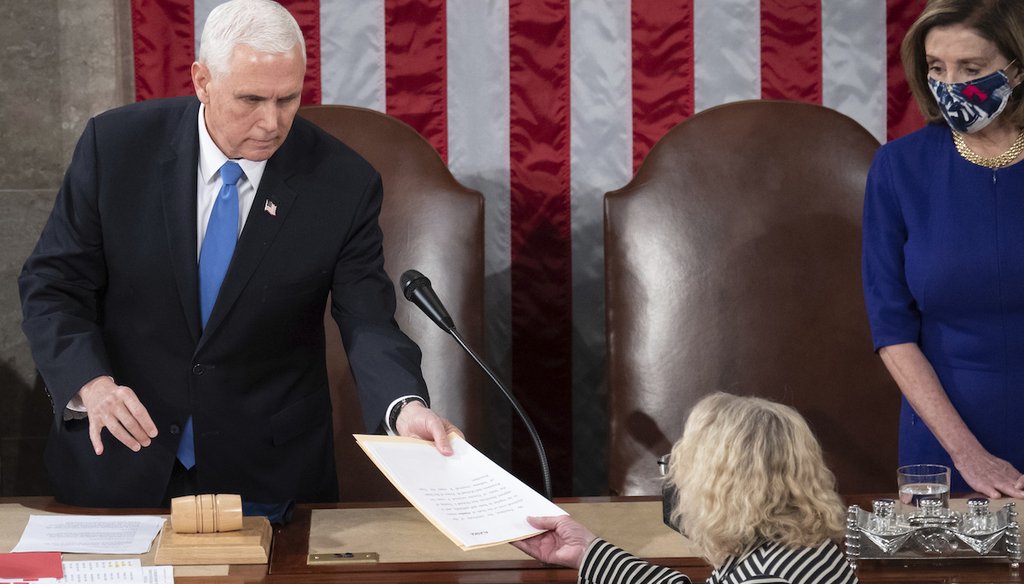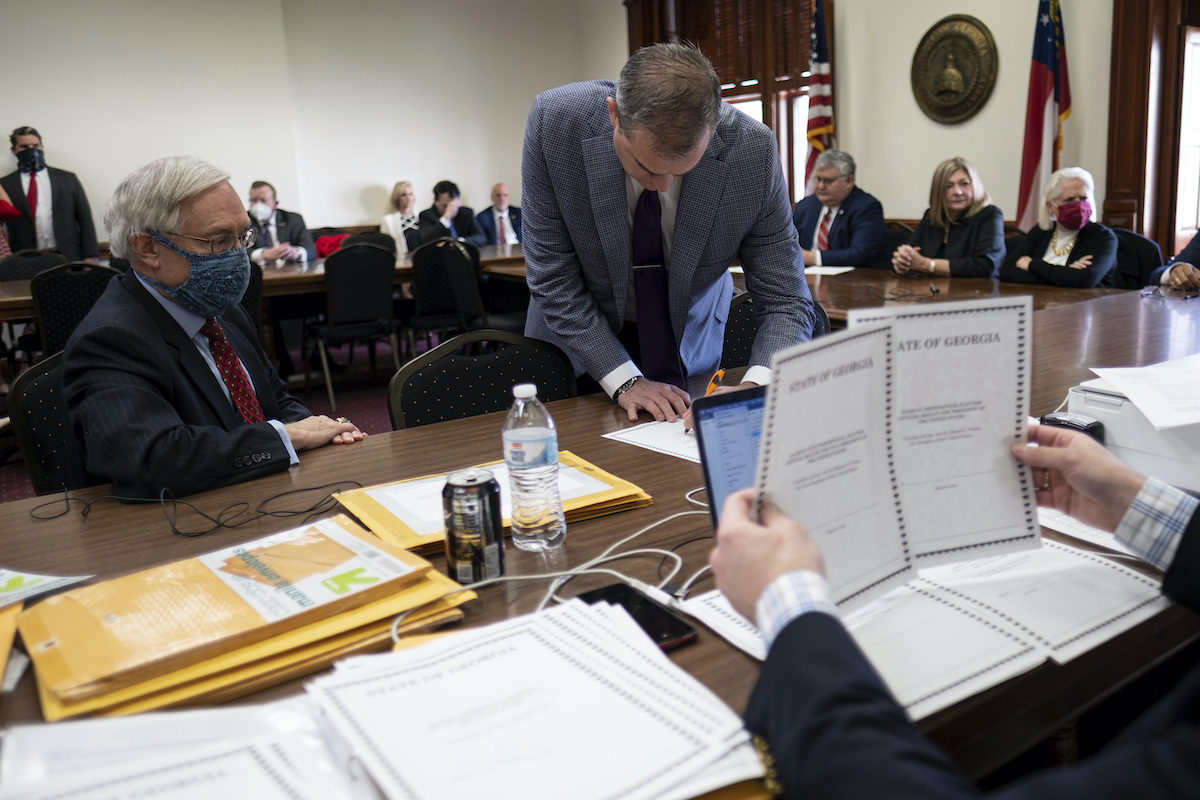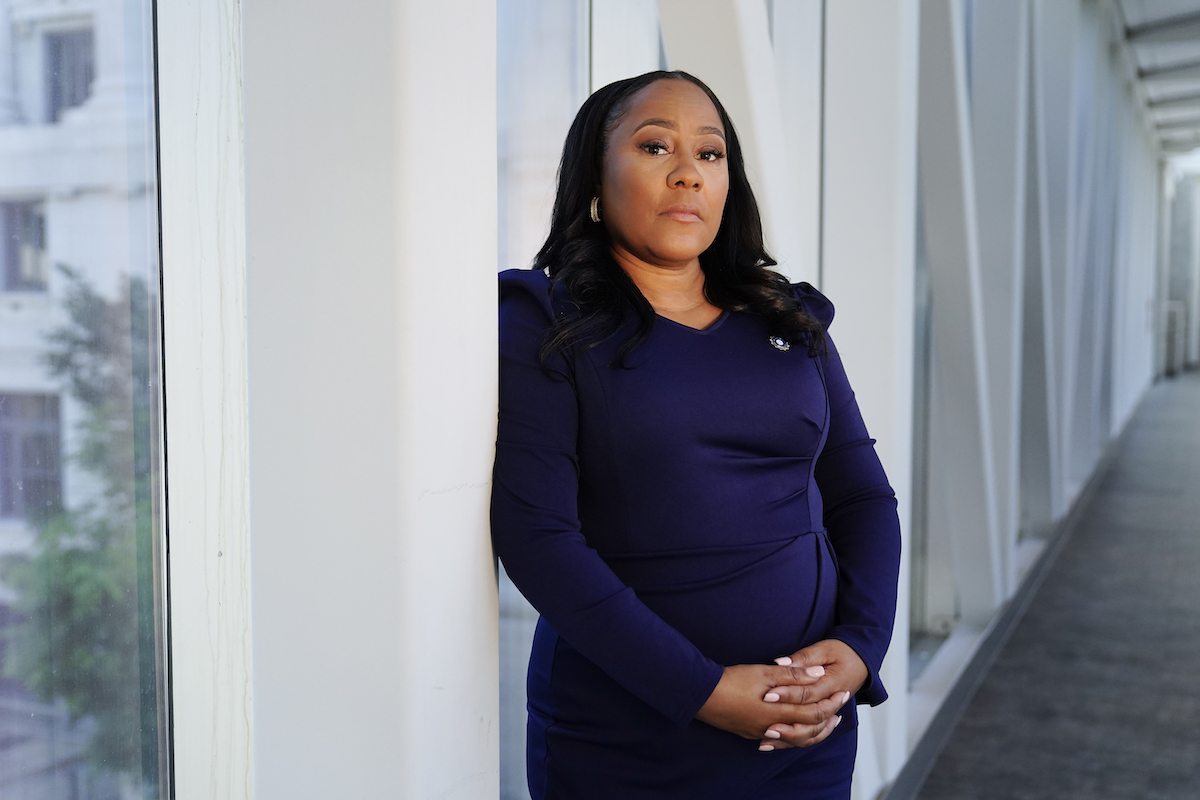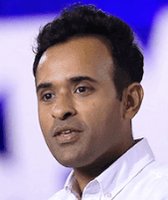Get PolitiFact in your inbox.

Vice President Mike Pence hands the electoral certificate from Arizona to Rep. Zoe Lofgren, D-Calif., as he presides over a joint session of Congress to count the Electoral College votes on Jan. 6, 2021. (AP)
It was an attempted heist right out in the open: a plan by Donald Trump’s allies to get "alternate" slates of electors to sign certificates declaring that Trump won key battleground states in 2020.
The plan, which would come to be known as the "fake elector" scheme, failed, as Vice President Mike Pence refused to consider Trump’s slates of electoral certificates on the riot-punctuated day of Jan. 6, 2021.
The office of Fani Willis, the district attorney in Georgia’s Fulton County, has said that people who signed the fake certificates in Georgia were targets of her investigation, which also addresses other efforts to overturn the election in the key battleground state that Joe Biden won. Indictments are expected in the Georgia case in August, and a federal indictment also looms.
Here’s a Q&A about how electors are supposed to work and how Trump and his allies tried to subvert the process.
What is an elector’s role?
Every four years, when voters cast ballots in a presidential election, they are actually choosing between slates of electors pledged to one of the candidates. Political parties in each state choose electors before the election. When a candidate wins a given state, that candidate’s slate of electors gathers a few weeks after Election Day to sign a certificate reflecting their votes for that candidate. These certificates are forwarded to Congress.
What was the fake elector scheme?
Trump allies sought to upend the results by using unauthorized electors. On Dec. 14, 2020, the duly chosen electors gathered in state capitols to sign certificates affirming which candidate won. On the same day in several battleground states, representatives of the losing side also gathered, claiming to be valid electors and signing certificates that falsely attested to a Trump win.
The fake electoral certificates were signed by Republican state lawmakers and party officials in Georgia, Arizona, Michigan, Pennsylvania, Wisconsin, Nevada and New Mexico — states accounting for a combined 84 electoral votes, enough to flip the result to Trump if they had been upheld.
An alternate slate of electors nominated by the Republican Party of Georgia cast electoral votes for President Donald Trump at the Georgia State Capitol on Dec. 14, 2020, at the same time the official Democratic electors met. (AP)
What was the role of the Trump campaign?
The alternate electors were part of a plan by Trump allies to give Pence a pretext for setting aside the official Electoral College votes Jan. 6, 2021.
John Eastman, a Trump-aligned lawyer, wrote a memo explaining a "Jan. 6 scenario" based on the submission of seven dual slates of electors to Pence. Eastman proposed that Pence announce that he had multiple slates of electors and, because of disputes in seven states, no electors from those could be valid.
The Trump campaign didn’t hide this strategy. Stephen Miller, a Trump campaign official, said Dec. 14, 2020, on Fox News that "as we speak today, an alternate slate of electors in the contested states is going to vote, and we are going to send those results up to Congress. This will ensure that all of our legal remedies remain open."
Rudy Giuliani, another Trump lawyer, coordinated the plan, The Washington Post reported. Emails show that a variety of people in Trump’s orbit were involved, The New York Times reported.
Trump pressured Pence to "reject fraudulently chosen electors" and to "do the right thing" and "send it back to the states to recertify." But Pence rejected that plan.
What did the fake certificates say?
Most of the fake certificates were put forward as if they were real ones. They had headers that said, "Certificate of the votes of the 2020 electors," and the signers referred to themselves as "being duly elected and qualified electors." The certificates said that the signers gathered to vote for Trump.
The certificates in Pennsylvania and New Mexico hedged by tweaking the language. The Pennsylvania certificate said its signers understood that a final court order would result in their being recognized as the "duly elected and qualified electors." The New Mexico certificate had similar language.
The documents claimed to be sent to the National Archives and state officials, including governors or secretaries of states.
Fulton County District Attorney Fani Willis on April 19, 2023, in Atlanta. (AP)
Will the Fulton County district attorney charge fake electors?
Sixteen people who signed the fake elector certificate in Georgia received a letter saying they are targets of an investigation, but at least half have accepted immunity deals.
Under Georgia law, it is unlawful to submit documentation to the government that makes materially false statements, said Anthony Michael Kreis, a Georgia State University law professor.
However, the key for Willis will be to show that there was criminal intent.
"On the one hand, there may be evidence to indicate the electors honestly believed they were acting in good faith to preserve a legal right," Kreis said. "On the other hand, no reasonable person by the time the electors met on Dec. 14, 2020, would have believed that Donald Trump won Georgia or that there was a viable, lawful way to overturn a certified election that had undergone three different counts without a change in the outcome."
What is the defense of fake electors or Trump?
Responses from the fake electors have been a mixed bag of deferred blame, denial and silence.
Some fake electors have pointed the finger back at Trump. In 2022, CNN obtained tapes in which one fake Michigan elector, Meshawn Maddock, said, "We fought to seat the electors. The Trump campaign asked us to do that." In Georgia, attorneys for the state’s GOP Chairman David Shafer claimed that he "acted in accordance with advice of legal counsel," which he shared with Trump as a plaintiff contesting the Georgia election.
The Detroit News reported that fake elector Michele Lundgren claimed she was duped, having just "signed a blank piece of paper."
"I was an innocent little bystander in this whole thing, thinking I was doing my civic duty," Lundgren told WDIV-TV.
Trump’s allies have tried to draw parallels between the 1960 and 2020 elections. Hawaii’s vote count in 1960 was too close to call, with Richard Nixon holding a small lead pending a recount.
Democratic electors cast their votes for John F. Kennedy Jr., and although that was premature, the recount later showed that Kennedy won narrowly. A key difference between the 1960 and 2020 cases is that in 1960, reasonable doubt existed about the outcome when the certificates were filed. A judge confirmed that the Democratic electors proceeded legally. Eventually, while Nixon, then the vice president, was presiding over the Electoral College count, he accepted the certified Democratic slate, saying it "properly and legally portrays the facts with respect to the electors chosen by the people of Hawaii."
How might the fake electors fit into the federal indictment about the 2020 election and Jan. 6?
Although only special counsel Jack Smith and his team have solid information about which laws could be in a Trump indictment, several of the laws attracting experts’ interest could touch upon the fake elector plan.
One, conspiracy to defraud the United States (18 U.S. Code § 371), would involve a conspiracy between at least two people related to committing another crime. The conspiracy could involve breaking a law against the submission of false documents (18 U.S.C. § 1001), which could include the false elector documents.
Another law against blocking an "official proceeding" (18 U.S. Code § 1512) could be invoked because the counting of electoral votes on Jan. 6 could be said to be an "official proceeding."
A third potential law used in an indictment is conspiracy against constitutional or statutory rights (18 U.S. Code § 241). Prosecutors could argue that some subset of voters had their "enjoyment of any right or privilege" infringed by the fake elector plan.
Have there been any arrests so far?
In Michigan, 16 people were charged with felonies related to fake electors.
Prosecutors are seeking to prove that these people knowingly created, signed and filed false documents in a conspiracy to defraud the election on Trump’s behalf. They were each charged with multiple counts including forgery and conspiracy to commit forgery.
"They weren’t the duly elected and qualified electors, and each of the defendants knew it," Michigan Attorney General Dana Nessel said while announcing the charges. They carried out actions hoping that the Michigan votes would be "awarded to the candidate of their choosing, instead of the candidate that Michigan voters actually chose."
Many of the defendants are prominent Republican Party figures in local, state or federal politics. Maddock, for example, was co-chair of the Michigan Republican Party after the 2020 election.
"This is part of a national coordinated lawfare to stop Trump," Maddock told CNN after the charges were filed.
Trump spokesperson Liz Harrington called the Michigan charges "propaganda to distract from the fact the 2020 Election was worthy of contesting."
How did Congress take action to prevent fake electors in the future?
Congress acted in 2022 to prevent fake electors in the future. Several provisions were inserted into a major spending bill passed in December 2022 to clarify parts of the 19th century Electoral Count Act that had governed the counting of electoral votes for well over a century.
Clarifying and limiting the role of the vice president. The provisions in the 2022 spending law says the vice president’s role is strictly "ministerial" — that is, ceremonial. The vice president "shall have no power to solely determine, accept, reject, or otherwise adjudicate or resolve disputes over the proper list of electors," the law says.
Shutting down "alternative" slates of electors. The 2022 law binds Congress to accept a single slate from each state — specifically, the one that has been properly certified.
Clarifying the way states must certify their electoral votes. The original 1887 electoral count law failed to say who at the state level — typically, the governor or secretary of state — had final say over certifying the slate of electors. The new law lets states decide who does the certification before an election. Once that choice is made, the deciding entity can’t be changed after the election is held.
Closing the "failed" election loophole. The 1845 Presidential Election Day Act includes a section about what states should do if they have "failed to make a choice" on Election Day. But the law didn’t define a "failed" election, an absence that Trump and his allies tried to take advantage of by saying the 2020 election had failed. The new law clarifies that only "extraordinary and catastrophic" events would be grounds for declaring a failed election.
Raising the bar for congressional challenges. Previously, it took just one senator and one representative to challenge election results from a given state during the joint session of Congress to certify electoral votes. That made it easy for both Republicans and Democrats to raise objections in recent elections. The bill would raise the threshold to one-fifth (20%) of each chamber.
RELATED: Which charges could be in a Jan. 6 indictment of Donald Trump?
RELATED: Here's what Donald Trump asked Georgia election officials in phone call about 2020 election
Our Sources
PolitiFact, What you need to know about the fake Trump electors, Jan. 28, 2022
Washington Post, The ‘fake electors’ and their role in the 2020 election, explained, July 20, 2023
New York Times, ‘Kind of Wild/Creative’: Emails Shed Light on Trump Fake Electors Plan, July 26, 2022
AP, Georgia fake electors may face charges in election probe, July 19, 2022
AP, At least 8 fake electors have immunity in Ga. election probe, May 5, 2023
Michigan Department of Attorney General, Michigan Attorney General Dana Nessel Charges 16 ‘False Electors’ with Election Law and Forgery Felonies, July 18, 2023
Michigan Department of Attorney General, False Slate Transcript, July 17, 2023
State of Michigan District Court, Affidavit in Support of Complaint, 18 July 2023
The Detroit Free Press, Who are the 16 Michigan Republicans charged in alleged 2020 election scheme?, July 19, 2023
Michigan AG Dana Nessel, speech, July 18, 2023
CNN, What we know about the 16 fake electors charged in Michigan, July 18, 2023
Liz Harrington, Truth Social (archive), July 18, 2023
The Detroit Free Press, Michigan GOP co-chair says Trump campaign directed fake electors, per CNN audio,
The Detroit Free Press, ‘Somewhat dicey' and ‘problematic’: Inside Trump's bid to have fake electors overturn 2020 election, July 25, 2023
The Detroit News, 16 false Trump electors face felony charges in Michigan, July 18, 2023
CNN, Michigan AG charges participants in 2020 fake elector plot July 18, 2023
CNN, From Mike Pence to ‘fake’ electors, here’s who has testified to the January 6 grand jury or met with prosecutors, July 11, 2023
POLITICO, See the 1960 Electoral College certificates that the false Trump electors say justify their gambit February 7, 2022
The Atlanta Journal-Constitution, Lawyers: Georgia GOP chair broke no laws as alternate Trump elector in 2020, May 8, 2023
Congress.gov, "H.R. 2617 - Consolidated Appropriations Act, 2023"
PolitiFact, "Electoral reform: What would updating the Electoral Count Act do?" Sept. 20, 2022
Derek T. Muller, "Congress passes legislation that will close off presidential election mischief and help avoid another Jan. 6," Dec. 12, 2022
Email interview, Anthony Michael Kreis, Georgia State University law professor July 25, 2023






































